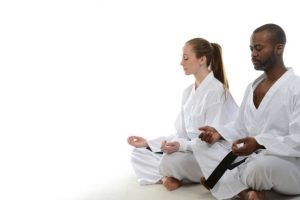The Psychological Well-Being and Performance of Athletes is Associated with Mindfulness
By John M. de Castro, Ph.D.
“So, while ‘mindfulness’ may seem like a current fad, the Zen-influenced philosophy and practice of karate training is in fact infused with mindfulness.” – Kris Chapman
Athletic performance requires the harmony of mind and body. Excellence is in part physical and in part psychological. That is why an entire profession of sports psychology has developed. “In sport psychology, competitive athletes are taught psychological strategies to better cope with a number of demanding challenges related to psychological functioning.” They use a number of techniques to enhance performance including mindfulness training. It has been shown to improve attention and concentration and emotion regulation and reduces anxiety and worry and rumination, and the physiological and psychological responses to stress. As a result, mindfulness training has been employed by athletes and even by entire teams to enhance their performance.
In today’s Research News article “The Relationship between Mindfulness Practices and the Psychological State and Performance of Kyokushin Karate Athletes.” (See summary below or view the full text of the study at: https://www.ncbi.nlm.nih.gov/pmc/articles/PMC8997751/ ) Vveinhardt and Kaspare recruited adult Karate athletes and had them complete measures of mindfulness, meditation experience, anxiety, depression, perceived stress, emotional state, Karate experience, and duration and intensity of sporting experience.
They found that the higher the levels of the athletes’ mindfulness the lower the levels of anxiety, depression, and perceived stress. Further, they found that the athletes who meditated had better emotional states than those who didn’t. Finally, they found that the higher the levels of mindfulness the higher the level of Karate performance as indicated by the belt they had obtained. Because these findings are correlative no conclusions regarding causation can be reached.
Hence, mindfulness was associated with better athletic performance and psychological well-being.
“Karate combines breathing with simple meditation to help students become more relaxed and centered.” – Scott Bullard
CMCS – Center for Mindfulness and Contemplative Studies
This and other Contemplative Studies posts are also available on Twitter @MindfulResearch
Study Summary
Vveinhardt, J., & Kaspare, M. (2022). The Relationship between Mindfulness Practices and the Psychological State and Performance of Kyokushin Karate Athletes. International journal of environmental research and public health, 19(7), 4001. https://doi.org/10.3390/ijerph19074001
Abstract
The aim of this study was to determine the relationship between mindfulness practices and the psychological state and qualification of kyokushin karate athletes. The survey was conducted using the Mindful Attention Awareness Scale (MAAS-15) and the Depression, Anxiety and Stress Scale (DASS-21). The study involved 371 Lithuanian kyokushin karate athletes (of which 59.3% were male and 40.7% were female; 71.4% of research participants have practiced this sport for 11 and more years and have the 1st dan or a higher belt). The results of the study showed a positive impact of mindfulness in reducing stress experienced by athletes, improving their psychological state, and enhancing their athletic performance. A moderate negative correlation was identified between stress, anxiety, and mindfulness, and while the mindfulness score was increasing, the severity level of depression was decreasing. Meanwhile, the correlation of the meditation effect and anxiety with kyokushin karate 0–7 kyu belt was very weak but statistically significant. The research results could be useful not only for athletes and their coaches but also for sports organizations. After analysing the benefits of mindfulness for kyokushin karate athletes, mindfulness practices are proposed for the effective improvement of athletes’ physical and psychological state when preparing for professional-level competitions.
https://www.ncbi.nlm.nih.gov/pmc/articles/PMC8997751/
